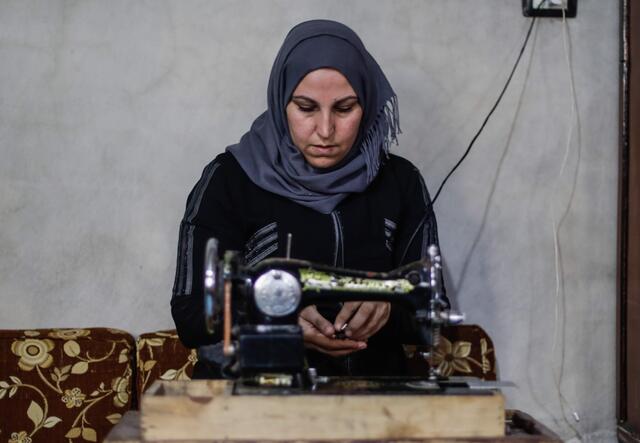
When the pandemic hit, Hamida, Um Abdo and Wa’ad turned their sewing skills to mask-making.
Employed by the IRC through our Cash For Work programme, these mothers in Syria are able to make an income whilst protecting their community from the coronavirus. The IRC distributes the masks they make to the community along with vital information about how people can stay protected from COVID-19.

Syria’s economy has been ravaged by almost a decade of war, the extra cash that came from selling the masks has been a life-line to support families through winter.
Vital income
“The difference is that I’m now able to buy supplies for home, wood for winter and I was able to repair my husband’s motorcycle,” says 38-year-old Um Abdo, who is a mother to four children and supports her husband who is paralysed. “The economic situation is hard. We have to buy water and we try to ration it as it’s so expensive to live here. Many people have had to pull their children out of school and send them to work to help their families secure an income.”

“It helped a lot,” 28-year-old Hamida agrees. “We have children that need to grow and nowadays the prices are so high, rents have tripled. The food we buy now is completely different to what we could afford 10 years ago, we’re getting chicken stock cubes instead of real chicken.”
Battling a pandemic in a war zone
“We continuously explain the virus to people,” says Tareq, an IRC staff member working in Idlib. “There are fears about the virus spreading. It happened in other countries, imagine how it will be for a country that has experienced war for almost 10 years. The health system barely covers the basic needs of our population.”
Despite the dangers the coronavirus poses, for many Syrians, their biggest struggle is living through years of conflict.
Coronavirus is hard but conflict is harder
“The conditions we are living in concern us more than the coronavirus – it’s a pandemic that will eventually end,” says Wa’ad, 40, who has been displaced ten times due to the conflict. “We’ve experienced shelling, displacement and poverty. We’ve left many indescribable things behind us... We’ve left our sons, our homes, our land and our livelihoods and we’ve come here. We never thought that we would be living this life. My biggest fear is that we’ll have to stay here for the rest of our lives and not be able to return home.”
Um Abdo agrees: “Coronavirus is hard but the conflict has been harder on us.”

Hamida, who had to flee her home in Aleppo in 2015, told us that her greatest fear is having to uproot her life again. She describes the terrifying moment when they decided to flee: “Our building was hit by airstrikes and split in half. The other half fell to the ground and everyone died, we faced many obstacles on the way here, including coming face to face withmembers of ISIS. Thank God my husband and all my four sons are here with me.”
Keeping hope alive
Ultimately, Hamida, Wa’ad and Um Abdo all share the same hopes -- that their children will not have to endure any more years of their life living in war or as Hamida says: “I wish the children have a better future than ours.”
“Life is full of ups and downs,” Um Abdo says. “I am proud that I work hard to help my family. I hope -- and dream -- that one day we’ll be able to return home.”
IRC in Syria
The year 2021 marks a decade of conflict in Syria, as violence, displacement and humanitarian needs continue to grow. Syria is also the deadliest country in the world for humanitarians. Attacks on aid workers, civilians, homes and hospitals remain common. Many families have been uprooted multiple times. The health system has been decimated, undermining Syrians’ ability to cope with the challenges of COVID-19. Learn more about our work in Syria.